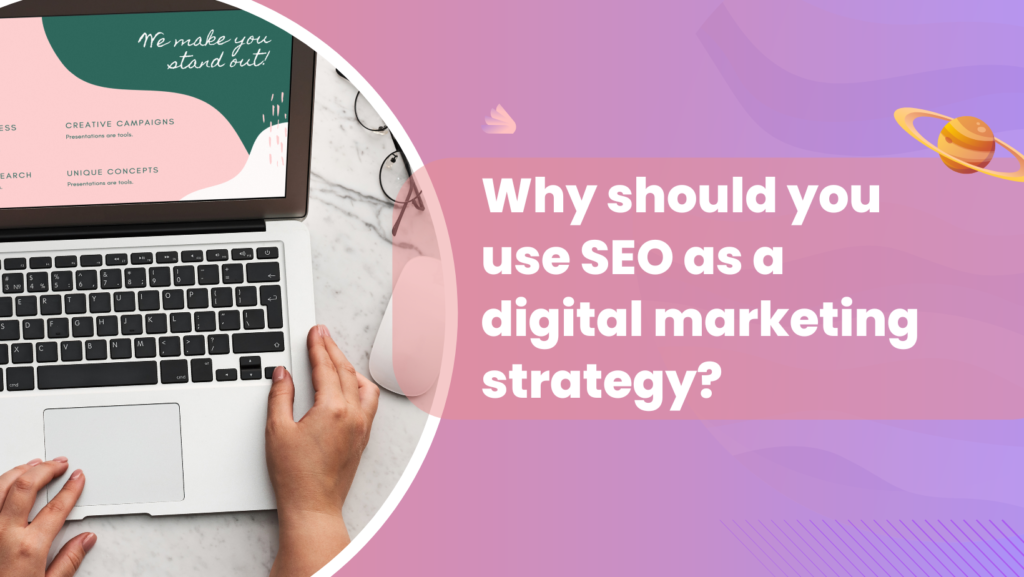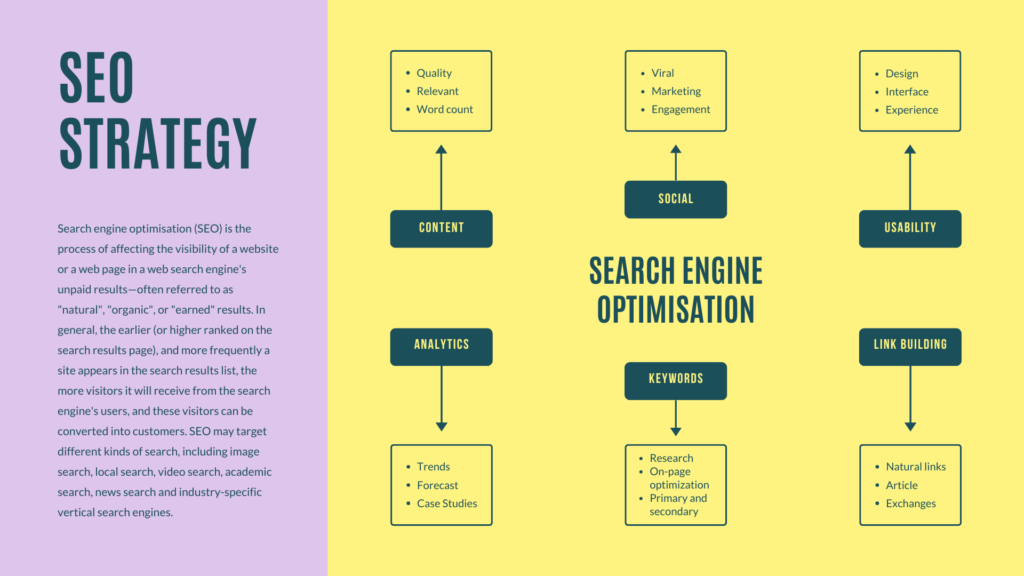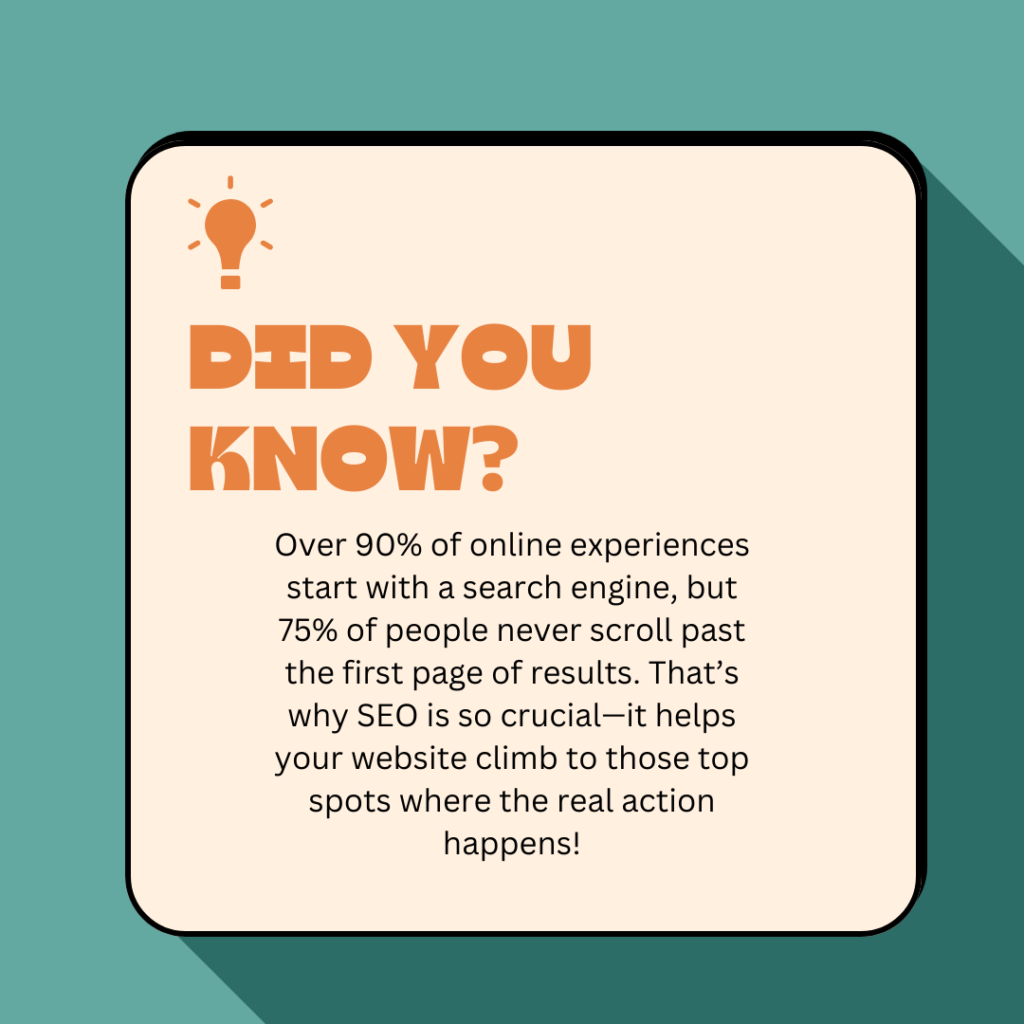
Let's Talk SEO : A Friendly Guide to Growing Your Online Presence"
In the world of the internet, there are millions of websites competing for attention. So, how does your website stand out in the crowd? That’s where SEO comes in. SEO (Search Engine Optimization) is like giving your website a map so search engines like Google can easily find and recommend it to people searching for what you offer.
Think of SEO as a way of making your website more “search engine friendly.” Just like how you tidy up your home before guests arrive, SEO helps organize your website so search engines understand it better. When done right, it boosts your chances of showing up higher on the search results, which means more people can find you without you having to pay for ads.

Why SEO is Important: The Secret to Getting Found Online
You’ve just opened a lovely new café in town. It’s cozy, the coffee smells amazing, and the pastries are fresh out of the oven. But there’s one problem—no one knows about it because it’s hidden down a side street with no signs pointing the way. SEO is like putting up those signs, showing people exactly where to find you.
Here’s why SEO matters so much for your website:
- It Brings People to You (Without Paying for Ads):
When you search for something on Google, do you scroll to the second or third page of results? Probably not. SEO helps make sure your website shows up on that precious first page. This means more people find you naturally—just like word-of-mouth recommendations for a café. And the best part? You don’t have to pay for every visitor like you do with ads. - It Builds Trust with Your Audience:
Ever notice how we tend to trust the websites that appear at the top of search results? SEO gets you there. Being at the top tells people, “This site is relevant, useful, and worth your time.” It’s like getting a trusted recommendation from a friend. - It’s a Long-Term Win:
Unlike running ads, where you pay every time someone clicks, SEO is an investment that keeps paying off. Once you’ve optimized your website, it can keep attracting visitors for a long time. Think of it as planting a tree that keeps growing, while paid ads are like buying flowers—they’re nice, but they don’t last as long. - It Makes Your Website User-Friendly: SEO isn’t just about impressing search engines; it’s about making your site better for people. A faster, easier-to-use website keeps visitors around longer. The better their experience, the more likely they are to stick with you—and search engines notice that, too.
Why Does SEO Matter?

Let’s think of search engines, like Google, as giant libraries. But instead of storing books, they store websites. So, when you type something into the search bar, Google acts like a super-smart librarian, quickly finding the most relevant websites for what you’re looking for. But how does it do that?
- Crawling:
First, Google sends out little bots (called “spiders”) to explore the internet. These bots go from page to page, checking out what’s on each site—kind of like a librarian walking through all the aisles to see which books are on the shelves. - Indexing:
Once these bots have explored a page, they send the information back to Google’s huge database. This is like the librarian taking notes on all the books and filing them away for later. This process is called indexing—Google is basically organizing everything it’s found, ready to pull it up when needed. - Ranking:
Now, when someone searches for something, Google quickly looks through its index to find the most relevant pages, but it doesn’t just throw them out randomly. Google ranks them, meaning it shows the best, most helpful results first—kind of like the librarian recommending the top books based on how good they are, how popular they are, and how well they match what you’re looking for.
The Role of Keywords
Here’s where keywords come into play. Keywords are simply the words or phrases people type into Google when searching for something. For example, if you’re craving pizza, you might type “best pizza near me.” That phrase, “best pizza near me,” is the keyword.
When you include these keywords on your website (in your content, titles, descriptions, etc.), it helps Google’s “librarians” know that your site is a good match for people searching for those words. It’s like putting labels on your book cover so the librarian knows exactly what’s inside.
But here’s the trick: you want to use keywords naturally—don’t stuff them everywhere! Think of it like writing the title of a book. You want it to be clear and catchy, but not overloaded with words. The same goes for your website’s content—keep it easy to read for humans while giving Google the clues it needs to rank you higher.
2. Keyword Research: The Heart of SEO Success
Why Keywords Are Important
Keywords are the bridge between what people are searching for and what you offer. Think of keywords as the language search engines speak—they help connect your content with the people actively looking for it.
When someone types a search query into Google, the search engine scans millions of pages to find the ones that most closely match those words. By using the right keywords in your content, you’re essentially telling Google, “Hey, my page is exactly what this person is looking for.” This boosts your chances of appearing in search results, bringing more visitors to your site.
But here’s the key: It’s not just about stuffing a bunch of keywords into your content. It’s about understanding the intent behind those words. Are people searching to buy something? To learn something? Or just to explore their options? Matching your content with the right keywords—and the right intent—means search engines are more likely to serve up your website as the perfect match.
3. On-Page SEO:
- Crafting Titles and Meta Descriptions: Explain that the title and meta description are the first things people see on search engines. Compare them to the cover of a book—they need to grab attention and give an idea of what’s inside.
- Optimizing Content for Readers and Search Engines: Stress the importance of writing for humans first and search engines second. Mention strategies like using headings (H1, H2), adding keywords naturally, and keeping sentences clear.
- Using Alt Text for Images: Share how alt text helps visually impaired users and search engines understand images, and how it improves your chances of ranking in image searches.
4. Technical SEO: Behind-the-Scenes Essentials
Making Your Website Fast
Think of your website like a movie. If it takes too long to load, people will get bored and leave before the action starts. A slow site frustrates visitors and hurts your SEO.
Quick Fixes:
- Compress Images: Large image files slow your site. Use tools like TinyPNG to shrink them without losing quality.
- Fast Web Host: Choose a reliable hosting provider that offers good speed. Your hosting is the engine that powers your site.
- Caching Plugin: Use plugins like WP Rocket or W3 Total Cache to store a version of your site, so it loads faster for repeat visitors.
Mobile-Friendliness
More people use their phones than computers to browse these days, and Google rewards sites that look and work great on mobile.
Simple Tips:
- Use responsive themes that automatically adjust to different screen sizes.
- Ensure text is readable without zooming, and buttons are easy to tap.
- Test your site with Google’s Mobile-Friendly Test to spot issues.
Fixing Broken Links
Broken links are like hitting a dead-end street—they frustrate users and hurt your SEO. Search engines don’t like sending people to pages that don’t exist.
How to Fix:
- Use free tools like Broken Link Checker to scan your site.
- Update or remove any broken links to ensure a smooth user experience.
